Rhiskey Bookey Bros Ltd. and EU Law: Free Movement of Goods Analysis
VerifiedAdded on 2022/10/04
|9
|2115
|21
Report
AI Summary
This report analyzes the application of EU law on the free movement of goods, focusing on a case involving Rhiskey Bookey Bros Ltd. (RBB Ltd.) and its expansion across Europe. The report examines the relevant provisions of the Treaty on the Functioning of the European Union (TFEU), specifically Articles 28-37, and defines 'goods' as per the Art Treasures case. It delves into restrictions on free movement, including those under Articles 34 (import restrictions), 35 (export restrictions), and 36 (derogations). The report analyzes specific concerns arising from RBB Ltd.'s operations in Italy, Spain, Germany, and France, evaluating the legality of restrictions such as advertising regulations, content inspections, publication bans, and intellectual property checks. By applying EU law principles and case law like Cassis de Dijon, the report assesses whether these measures are justified and provides advice on how RBB Ltd. can leverage EU law to its benefit. The report concludes by evaluating the justifications for the restrictions and analyzing whether they are in compliance with the principles of free movement of goods within the European Union.
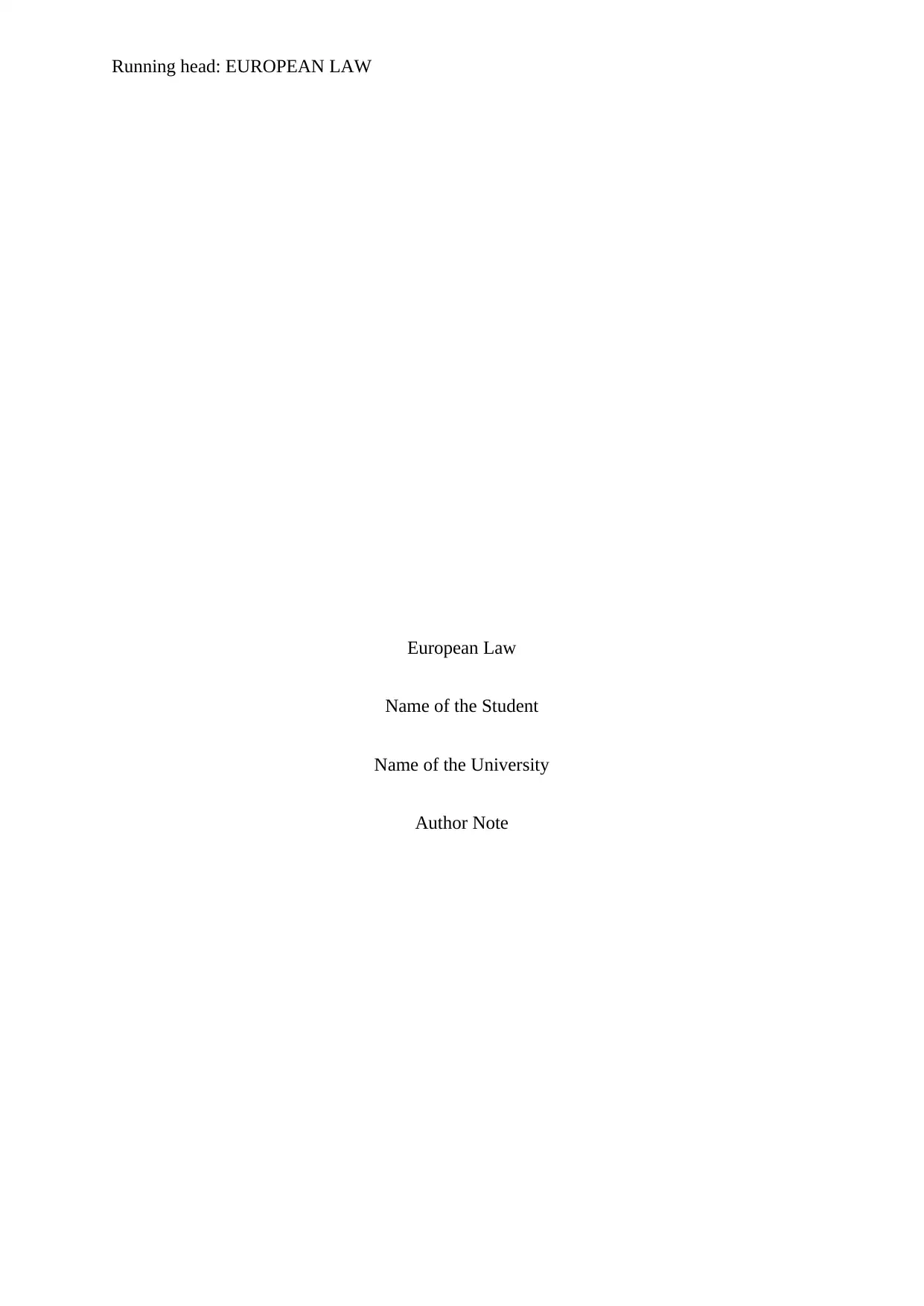
Running head: EUROPEAN LAW
European Law
Name of the Student
Name of the University
Author Note
European Law
Name of the Student
Name of the University
Author Note
Paraphrase This Document
Need a fresh take? Get an instant paraphrase of this document with our AI Paraphraser
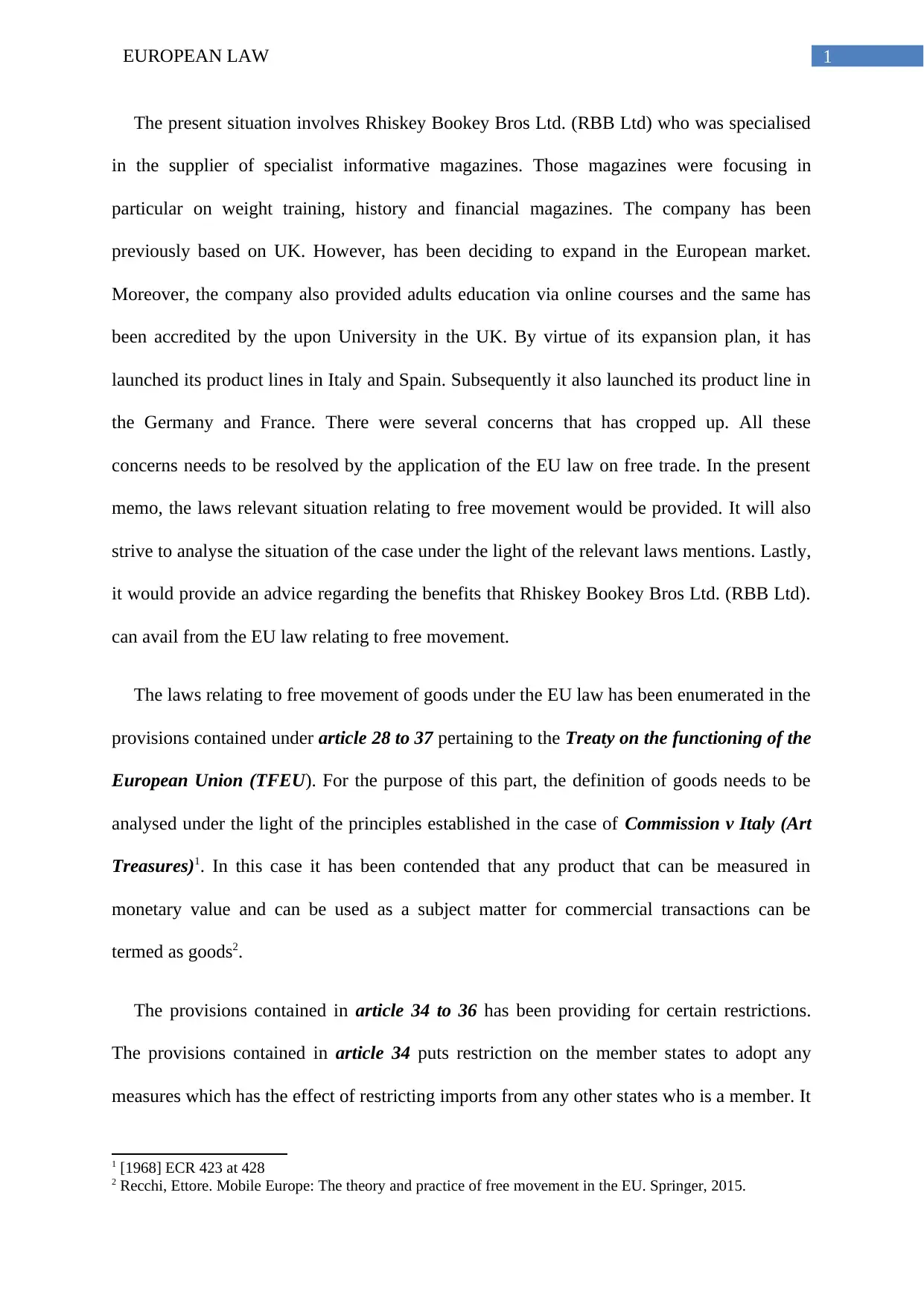
1EUROPEAN LAW
The present situation involves Rhiskey Bookey Bros Ltd. (RBB Ltd) who was specialised
in the supplier of specialist informative magazines. Those magazines were focusing in
particular on weight training, history and financial magazines. The company has been
previously based on UK. However, has been deciding to expand in the European market.
Moreover, the company also provided adults education via online courses and the same has
been accredited by the upon University in the UK. By virtue of its expansion plan, it has
launched its product lines in Italy and Spain. Subsequently it also launched its product line in
the Germany and France. There were several concerns that has cropped up. All these
concerns needs to be resolved by the application of the EU law on free trade. In the present
memo, the laws relevant situation relating to free movement would be provided. It will also
strive to analyse the situation of the case under the light of the relevant laws mentions. Lastly,
it would provide an advice regarding the benefits that Rhiskey Bookey Bros Ltd. (RBB Ltd).
can avail from the EU law relating to free movement.
The laws relating to free movement of goods under the EU law has been enumerated in the
provisions contained under article 28 to 37 pertaining to the Treaty on the functioning of the
European Union (TFEU). For the purpose of this part, the definition of goods needs to be
analysed under the light of the principles established in the case of Commission v Italy (Art
Treasures)1. In this case it has been contended that any product that can be measured in
monetary value and can be used as a subject matter for commercial transactions can be
termed as goods2.
The provisions contained in article 34 to 36 has been providing for certain restrictions.
The provisions contained in article 34 puts restriction on the member states to adopt any
measures which has the effect of restricting imports from any other states who is a member. It
1 [1968] ECR 423 at 428
2 Recchi, Ettore. Mobile Europe: The theory and practice of free movement in the EU. Springer, 2015.
The present situation involves Rhiskey Bookey Bros Ltd. (RBB Ltd) who was specialised
in the supplier of specialist informative magazines. Those magazines were focusing in
particular on weight training, history and financial magazines. The company has been
previously based on UK. However, has been deciding to expand in the European market.
Moreover, the company also provided adults education via online courses and the same has
been accredited by the upon University in the UK. By virtue of its expansion plan, it has
launched its product lines in Italy and Spain. Subsequently it also launched its product line in
the Germany and France. There were several concerns that has cropped up. All these
concerns needs to be resolved by the application of the EU law on free trade. In the present
memo, the laws relevant situation relating to free movement would be provided. It will also
strive to analyse the situation of the case under the light of the relevant laws mentions. Lastly,
it would provide an advice regarding the benefits that Rhiskey Bookey Bros Ltd. (RBB Ltd).
can avail from the EU law relating to free movement.
The laws relating to free movement of goods under the EU law has been enumerated in the
provisions contained under article 28 to 37 pertaining to the Treaty on the functioning of the
European Union (TFEU). For the purpose of this part, the definition of goods needs to be
analysed under the light of the principles established in the case of Commission v Italy (Art
Treasures)1. In this case it has been contended that any product that can be measured in
monetary value and can be used as a subject matter for commercial transactions can be
termed as goods2.
The provisions contained in article 34 to 36 has been providing for certain restrictions.
The provisions contained in article 34 puts restriction on the member states to adopt any
measures which has the effect of restricting imports from any other states who is a member. It
1 [1968] ECR 423 at 428
2 Recchi, Ettore. Mobile Europe: The theory and practice of free movement in the EU. Springer, 2015.
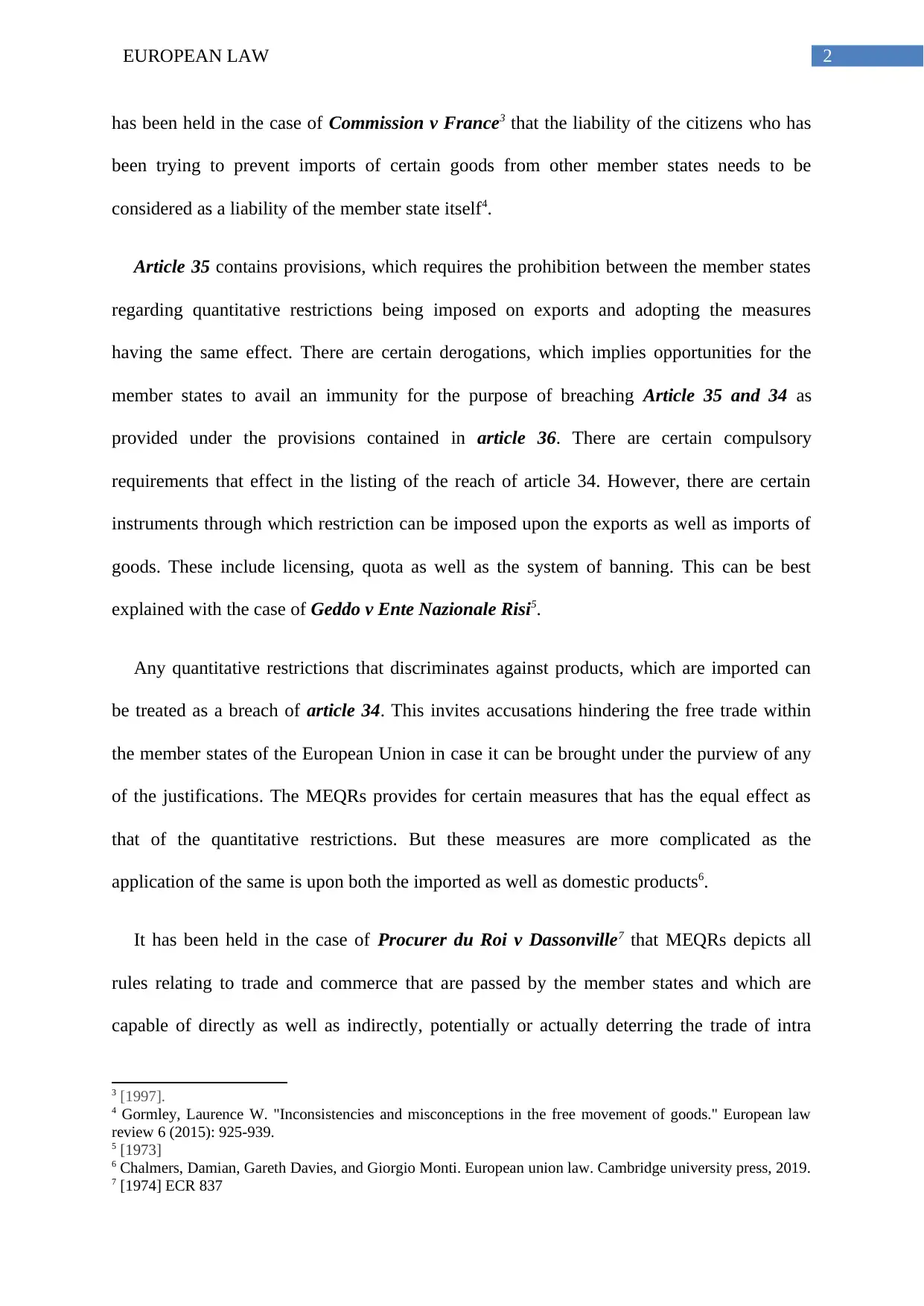
2EUROPEAN LAW
has been held in the case of Commission v France3 that the liability of the citizens who has
been trying to prevent imports of certain goods from other member states needs to be
considered as a liability of the member state itself4.
Article 35 contains provisions, which requires the prohibition between the member states
regarding quantitative restrictions being imposed on exports and adopting the measures
having the same effect. There are certain derogations, which implies opportunities for the
member states to avail an immunity for the purpose of breaching Article 35 and 34 as
provided under the provisions contained in article 36. There are certain compulsory
requirements that effect in the listing of the reach of article 34. However, there are certain
instruments through which restriction can be imposed upon the exports as well as imports of
goods. These include licensing, quota as well as the system of banning. This can be best
explained with the case of Geddo v Ente Nazionale Risi5.
Any quantitative restrictions that discriminates against products, which are imported can
be treated as a breach of article 34. This invites accusations hindering the free trade within
the member states of the European Union in case it can be brought under the purview of any
of the justifications. The MEQRs provides for certain measures that has the equal effect as
that of the quantitative restrictions. But these measures are more complicated as the
application of the same is upon both the imported as well as domestic products6.
It has been held in the case of Procurer du Roi v Dassonville7 that MEQRs depicts all
rules relating to trade and commerce that are passed by the member states and which are
capable of directly as well as indirectly, potentially or actually deterring the trade of intra
3 [1997].
4 Gormley, Laurence W. "Inconsistencies and misconceptions in the free movement of goods." European law
review 6 (2015): 925-939.
5 [1973]
6 Chalmers, Damian, Gareth Davies, and Giorgio Monti. European union law. Cambridge university press, 2019.
7 [1974] ECR 837
has been held in the case of Commission v France3 that the liability of the citizens who has
been trying to prevent imports of certain goods from other member states needs to be
considered as a liability of the member state itself4.
Article 35 contains provisions, which requires the prohibition between the member states
regarding quantitative restrictions being imposed on exports and adopting the measures
having the same effect. There are certain derogations, which implies opportunities for the
member states to avail an immunity for the purpose of breaching Article 35 and 34 as
provided under the provisions contained in article 36. There are certain compulsory
requirements that effect in the listing of the reach of article 34. However, there are certain
instruments through which restriction can be imposed upon the exports as well as imports of
goods. These include licensing, quota as well as the system of banning. This can be best
explained with the case of Geddo v Ente Nazionale Risi5.
Any quantitative restrictions that discriminates against products, which are imported can
be treated as a breach of article 34. This invites accusations hindering the free trade within
the member states of the European Union in case it can be brought under the purview of any
of the justifications. The MEQRs provides for certain measures that has the equal effect as
that of the quantitative restrictions. But these measures are more complicated as the
application of the same is upon both the imported as well as domestic products6.
It has been held in the case of Procurer du Roi v Dassonville7 that MEQRs depicts all
rules relating to trade and commerce that are passed by the member states and which are
capable of directly as well as indirectly, potentially or actually deterring the trade of intra
3 [1997].
4 Gormley, Laurence W. "Inconsistencies and misconceptions in the free movement of goods." European law
review 6 (2015): 925-939.
5 [1973]
6 Chalmers, Damian, Gareth Davies, and Giorgio Monti. European union law. Cambridge university press, 2019.
7 [1974] ECR 837
⊘ This is a preview!⊘
Do you want full access?
Subscribe today to unlock all pages.

Trusted by 1+ million students worldwide
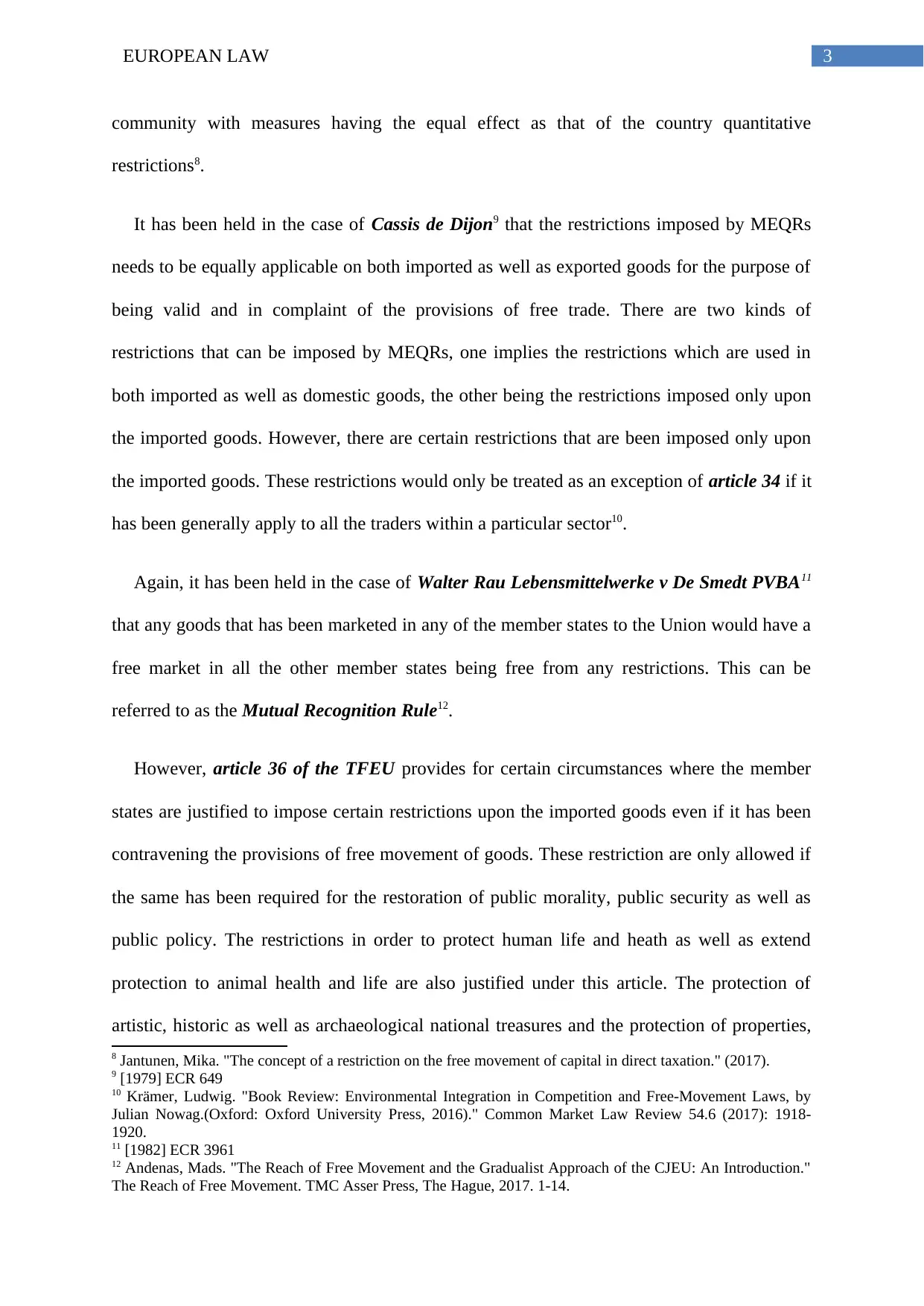
3EUROPEAN LAW
community with measures having the equal effect as that of the country quantitative
restrictions8.
It has been held in the case of Cassis de Dijon9 that the restrictions imposed by MEQRs
needs to be equally applicable on both imported as well as exported goods for the purpose of
being valid and in complaint of the provisions of free trade. There are two kinds of
restrictions that can be imposed by MEQRs, one implies the restrictions which are used in
both imported as well as domestic goods, the other being the restrictions imposed only upon
the imported goods. However, there are certain restrictions that are been imposed only upon
the imported goods. These restrictions would only be treated as an exception of article 34 if it
has been generally apply to all the traders within a particular sector10.
Again, it has been held in the case of Walter Rau Lebensmittelwerke v De Smedt PVBA11
that any goods that has been marketed in any of the member states to the Union would have a
free market in all the other member states being free from any restrictions. This can be
referred to as the Mutual Recognition Rule12.
However, article 36 of the TFEU provides for certain circumstances where the member
states are justified to impose certain restrictions upon the imported goods even if it has been
contravening the provisions of free movement of goods. These restriction are only allowed if
the same has been required for the restoration of public morality, public security as well as
public policy. The restrictions in order to protect human life and heath as well as extend
protection to animal health and life are also justified under this article. The protection of
artistic, historic as well as archaeological national treasures and the protection of properties,
8 Jantunen, Mika. "The concept of a restriction on the free movement of capital in direct taxation." (2017).
9 [1979] ECR 649
10 Krämer, Ludwig. "Book Review: Environmental Integration in Competition and Free-Movement Laws, by
Julian Nowag.(Oxford: Oxford University Press, 2016)." Common Market Law Review 54.6 (2017): 1918-
1920.
11 [1982] ECR 3961
12 Andenas, Mads. "The Reach of Free Movement and the Gradualist Approach of the CJEU: An Introduction."
The Reach of Free Movement. TMC Asser Press, The Hague, 2017. 1-14.
community with measures having the equal effect as that of the country quantitative
restrictions8.
It has been held in the case of Cassis de Dijon9 that the restrictions imposed by MEQRs
needs to be equally applicable on both imported as well as exported goods for the purpose of
being valid and in complaint of the provisions of free trade. There are two kinds of
restrictions that can be imposed by MEQRs, one implies the restrictions which are used in
both imported as well as domestic goods, the other being the restrictions imposed only upon
the imported goods. However, there are certain restrictions that are been imposed only upon
the imported goods. These restrictions would only be treated as an exception of article 34 if it
has been generally apply to all the traders within a particular sector10.
Again, it has been held in the case of Walter Rau Lebensmittelwerke v De Smedt PVBA11
that any goods that has been marketed in any of the member states to the Union would have a
free market in all the other member states being free from any restrictions. This can be
referred to as the Mutual Recognition Rule12.
However, article 36 of the TFEU provides for certain circumstances where the member
states are justified to impose certain restrictions upon the imported goods even if it has been
contravening the provisions of free movement of goods. These restriction are only allowed if
the same has been required for the restoration of public morality, public security as well as
public policy. The restrictions in order to protect human life and heath as well as extend
protection to animal health and life are also justified under this article. The protection of
artistic, historic as well as archaeological national treasures and the protection of properties,
8 Jantunen, Mika. "The concept of a restriction on the free movement of capital in direct taxation." (2017).
9 [1979] ECR 649
10 Krämer, Ludwig. "Book Review: Environmental Integration in Competition and Free-Movement Laws, by
Julian Nowag.(Oxford: Oxford University Press, 2016)." Common Market Law Review 54.6 (2017): 1918-
1920.
11 [1982] ECR 3961
12 Andenas, Mads. "The Reach of Free Movement and the Gradualist Approach of the CJEU: An Introduction."
The Reach of Free Movement. TMC Asser Press, The Hague, 2017. 1-14.
Paraphrase This Document
Need a fresh take? Get an instant paraphrase of this document with our AI Paraphraser
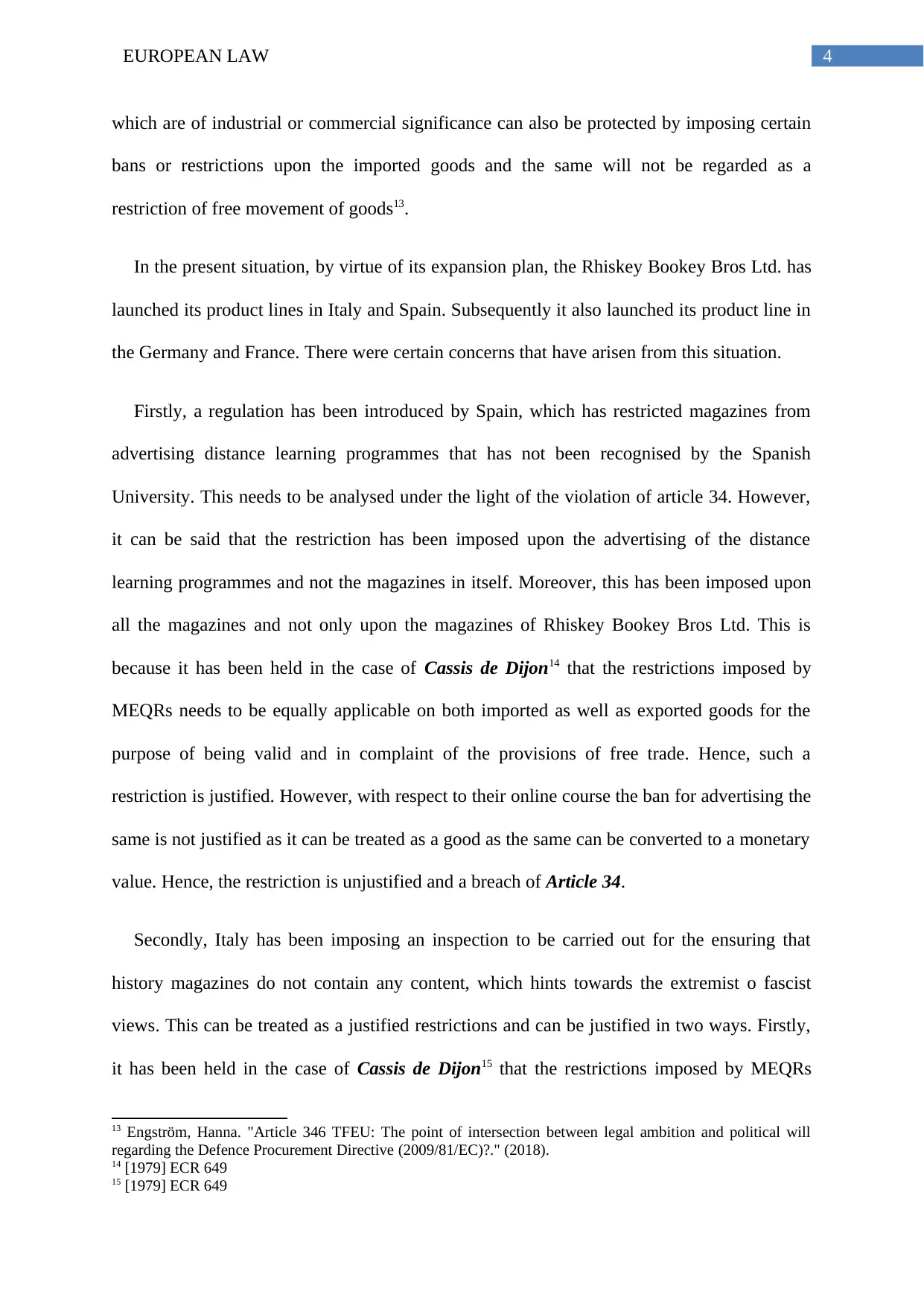
4EUROPEAN LAW
which are of industrial or commercial significance can also be protected by imposing certain
bans or restrictions upon the imported goods and the same will not be regarded as a
restriction of free movement of goods13.
In the present situation, by virtue of its expansion plan, the Rhiskey Bookey Bros Ltd. has
launched its product lines in Italy and Spain. Subsequently it also launched its product line in
the Germany and France. There were certain concerns that have arisen from this situation.
Firstly, a regulation has been introduced by Spain, which has restricted magazines from
advertising distance learning programmes that has not been recognised by the Spanish
University. This needs to be analysed under the light of the violation of article 34. However,
it can be said that the restriction has been imposed upon the advertising of the distance
learning programmes and not the magazines in itself. Moreover, this has been imposed upon
all the magazines and not only upon the magazines of Rhiskey Bookey Bros Ltd. This is
because it has been held in the case of Cassis de Dijon14 that the restrictions imposed by
MEQRs needs to be equally applicable on both imported as well as exported goods for the
purpose of being valid and in complaint of the provisions of free trade. Hence, such a
restriction is justified. However, with respect to their online course the ban for advertising the
same is not justified as it can be treated as a good as the same can be converted to a monetary
value. Hence, the restriction is unjustified and a breach of Article 34.
Secondly, Italy has been imposing an inspection to be carried out for the ensuring that
history magazines do not contain any content, which hints towards the extremist o fascist
views. This can be treated as a justified restrictions and can be justified in two ways. Firstly,
it has been held in the case of Cassis de Dijon15 that the restrictions imposed by MEQRs
13 Engström, Hanna. "Article 346 TFEU: The point of intersection between legal ambition and political will
regarding the Defence Procurement Directive (2009/81/EC)?." (2018).
14 [1979] ECR 649
15 [1979] ECR 649
which are of industrial or commercial significance can also be protected by imposing certain
bans or restrictions upon the imported goods and the same will not be regarded as a
restriction of free movement of goods13.
In the present situation, by virtue of its expansion plan, the Rhiskey Bookey Bros Ltd. has
launched its product lines in Italy and Spain. Subsequently it also launched its product line in
the Germany and France. There were certain concerns that have arisen from this situation.
Firstly, a regulation has been introduced by Spain, which has restricted magazines from
advertising distance learning programmes that has not been recognised by the Spanish
University. This needs to be analysed under the light of the violation of article 34. However,
it can be said that the restriction has been imposed upon the advertising of the distance
learning programmes and not the magazines in itself. Moreover, this has been imposed upon
all the magazines and not only upon the magazines of Rhiskey Bookey Bros Ltd. This is
because it has been held in the case of Cassis de Dijon14 that the restrictions imposed by
MEQRs needs to be equally applicable on both imported as well as exported goods for the
purpose of being valid and in complaint of the provisions of free trade. Hence, such a
restriction is justified. However, with respect to their online course the ban for advertising the
same is not justified as it can be treated as a good as the same can be converted to a monetary
value. Hence, the restriction is unjustified and a breach of Article 34.
Secondly, Italy has been imposing an inspection to be carried out for the ensuring that
history magazines do not contain any content, which hints towards the extremist o fascist
views. This can be treated as a justified restrictions and can be justified in two ways. Firstly,
it has been held in the case of Cassis de Dijon15 that the restrictions imposed by MEQRs
13 Engström, Hanna. "Article 346 TFEU: The point of intersection between legal ambition and political will
regarding the Defence Procurement Directive (2009/81/EC)?." (2018).
14 [1979] ECR 649
15 [1979] ECR 649
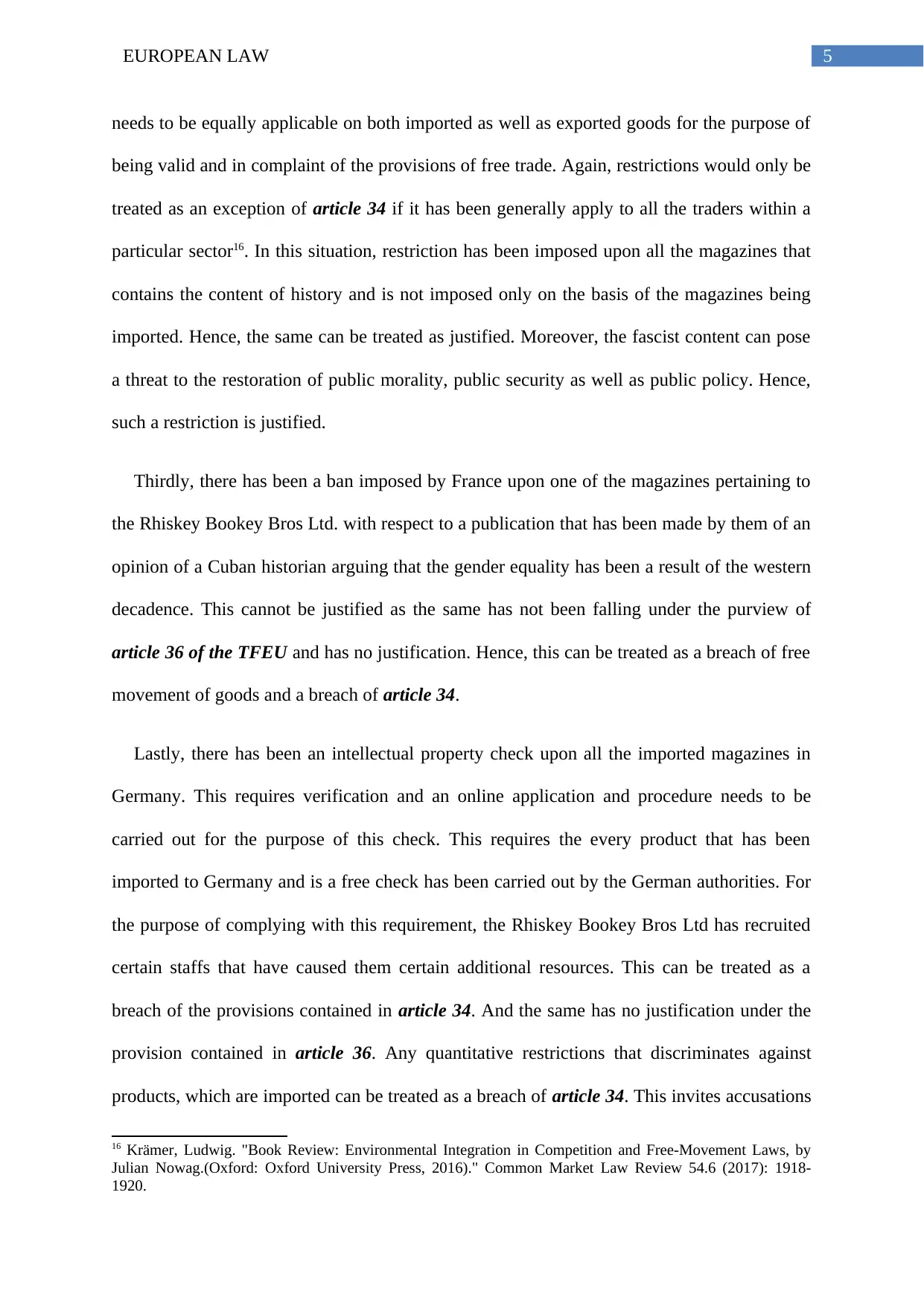
5EUROPEAN LAW
needs to be equally applicable on both imported as well as exported goods for the purpose of
being valid and in complaint of the provisions of free trade. Again, restrictions would only be
treated as an exception of article 34 if it has been generally apply to all the traders within a
particular sector16. In this situation, restriction has been imposed upon all the magazines that
contains the content of history and is not imposed only on the basis of the magazines being
imported. Hence, the same can be treated as justified. Moreover, the fascist content can pose
a threat to the restoration of public morality, public security as well as public policy. Hence,
such a restriction is justified.
Thirdly, there has been a ban imposed by France upon one of the magazines pertaining to
the Rhiskey Bookey Bros Ltd. with respect to a publication that has been made by them of an
opinion of a Cuban historian arguing that the gender equality has been a result of the western
decadence. This cannot be justified as the same has not been falling under the purview of
article 36 of the TFEU and has no justification. Hence, this can be treated as a breach of free
movement of goods and a breach of article 34.
Lastly, there has been an intellectual property check upon all the imported magazines in
Germany. This requires verification and an online application and procedure needs to be
carried out for the purpose of this check. This requires the every product that has been
imported to Germany and is a free check has been carried out by the German authorities. For
the purpose of complying with this requirement, the Rhiskey Bookey Bros Ltd has recruited
certain staffs that have caused them certain additional resources. This can be treated as a
breach of the provisions contained in article 34. And the same has no justification under the
provision contained in article 36. Any quantitative restrictions that discriminates against
products, which are imported can be treated as a breach of article 34. This invites accusations
16 Krämer, Ludwig. "Book Review: Environmental Integration in Competition and Free-Movement Laws, by
Julian Nowag.(Oxford: Oxford University Press, 2016)." Common Market Law Review 54.6 (2017): 1918-
1920.
needs to be equally applicable on both imported as well as exported goods for the purpose of
being valid and in complaint of the provisions of free trade. Again, restrictions would only be
treated as an exception of article 34 if it has been generally apply to all the traders within a
particular sector16. In this situation, restriction has been imposed upon all the magazines that
contains the content of history and is not imposed only on the basis of the magazines being
imported. Hence, the same can be treated as justified. Moreover, the fascist content can pose
a threat to the restoration of public morality, public security as well as public policy. Hence,
such a restriction is justified.
Thirdly, there has been a ban imposed by France upon one of the magazines pertaining to
the Rhiskey Bookey Bros Ltd. with respect to a publication that has been made by them of an
opinion of a Cuban historian arguing that the gender equality has been a result of the western
decadence. This cannot be justified as the same has not been falling under the purview of
article 36 of the TFEU and has no justification. Hence, this can be treated as a breach of free
movement of goods and a breach of article 34.
Lastly, there has been an intellectual property check upon all the imported magazines in
Germany. This requires verification and an online application and procedure needs to be
carried out for the purpose of this check. This requires the every product that has been
imported to Germany and is a free check has been carried out by the German authorities. For
the purpose of complying with this requirement, the Rhiskey Bookey Bros Ltd has recruited
certain staffs that have caused them certain additional resources. This can be treated as a
breach of the provisions contained in article 34. And the same has no justification under the
provision contained in article 36. Any quantitative restrictions that discriminates against
products, which are imported can be treated as a breach of article 34. This invites accusations
16 Krämer, Ludwig. "Book Review: Environmental Integration in Competition and Free-Movement Laws, by
Julian Nowag.(Oxford: Oxford University Press, 2016)." Common Market Law Review 54.6 (2017): 1918-
1920.
⊘ This is a preview!⊘
Do you want full access?
Subscribe today to unlock all pages.

Trusted by 1+ million students worldwide
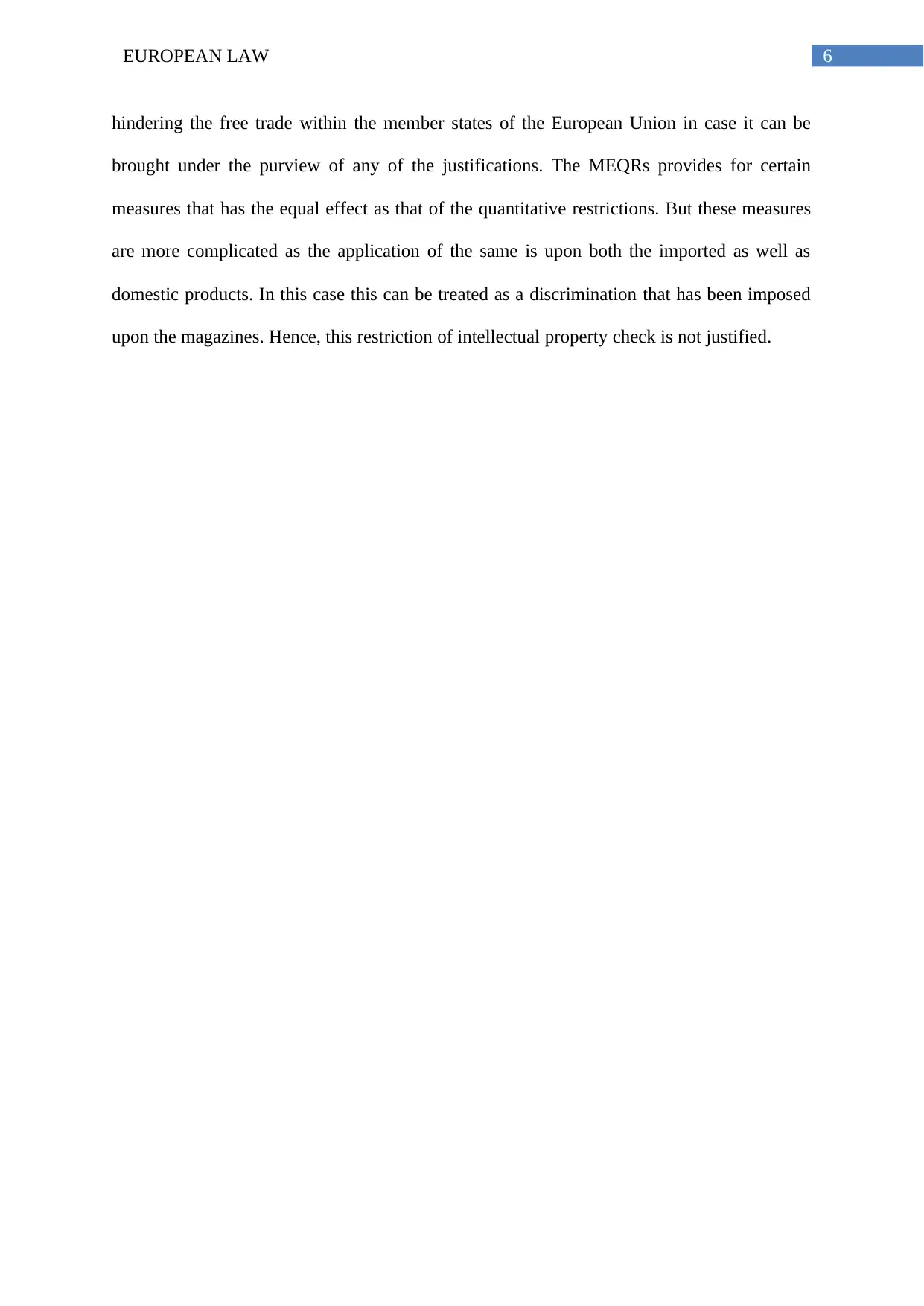
6EUROPEAN LAW
hindering the free trade within the member states of the European Union in case it can be
brought under the purview of any of the justifications. The MEQRs provides for certain
measures that has the equal effect as that of the quantitative restrictions. But these measures
are more complicated as the application of the same is upon both the imported as well as
domestic products. In this case this can be treated as a discrimination that has been imposed
upon the magazines. Hence, this restriction of intellectual property check is not justified.
hindering the free trade within the member states of the European Union in case it can be
brought under the purview of any of the justifications. The MEQRs provides for certain
measures that has the equal effect as that of the quantitative restrictions. But these measures
are more complicated as the application of the same is upon both the imported as well as
domestic products. In this case this can be treated as a discrimination that has been imposed
upon the magazines. Hence, this restriction of intellectual property check is not justified.
Paraphrase This Document
Need a fresh take? Get an instant paraphrase of this document with our AI Paraphraser
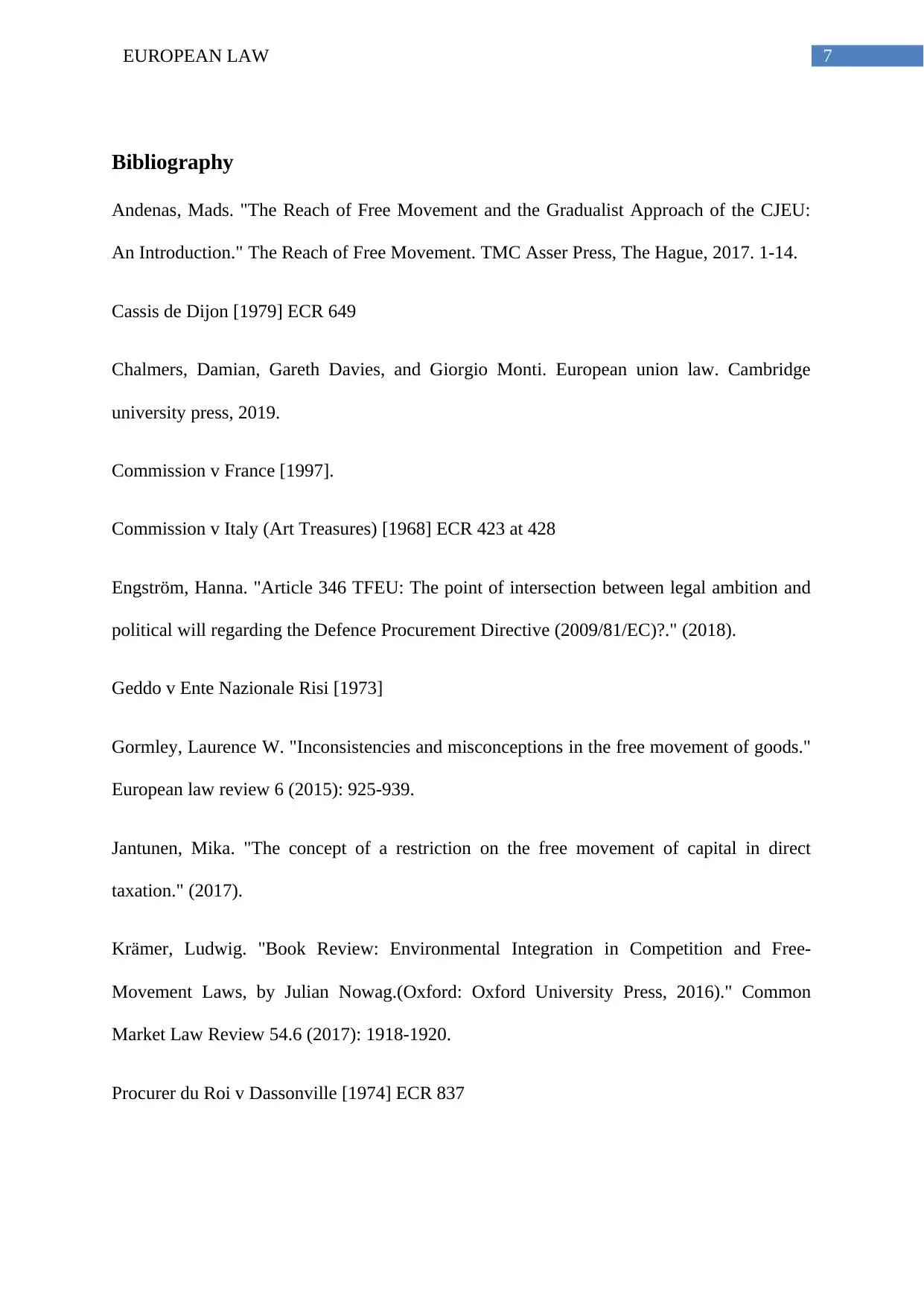
7EUROPEAN LAW
Bibliography
Andenas, Mads. "The Reach of Free Movement and the Gradualist Approach of the CJEU:
An Introduction." The Reach of Free Movement. TMC Asser Press, The Hague, 2017. 1-14.
Cassis de Dijon [1979] ECR 649
Chalmers, Damian, Gareth Davies, and Giorgio Monti. European union law. Cambridge
university press, 2019.
Commission v France [1997].
Commission v Italy (Art Treasures) [1968] ECR 423 at 428
Engström, Hanna. "Article 346 TFEU: The point of intersection between legal ambition and
political will regarding the Defence Procurement Directive (2009/81/EC)?." (2018).
Geddo v Ente Nazionale Risi [1973]
Gormley, Laurence W. "Inconsistencies and misconceptions in the free movement of goods."
European law review 6 (2015): 925-939.
Jantunen, Mika. "The concept of a restriction on the free movement of capital in direct
taxation." (2017).
Krämer, Ludwig. "Book Review: Environmental Integration in Competition and Free-
Movement Laws, by Julian Nowag.(Oxford: Oxford University Press, 2016)." Common
Market Law Review 54.6 (2017): 1918-1920.
Procurer du Roi v Dassonville [1974] ECR 837
Bibliography
Andenas, Mads. "The Reach of Free Movement and the Gradualist Approach of the CJEU:
An Introduction." The Reach of Free Movement. TMC Asser Press, The Hague, 2017. 1-14.
Cassis de Dijon [1979] ECR 649
Chalmers, Damian, Gareth Davies, and Giorgio Monti. European union law. Cambridge
university press, 2019.
Commission v France [1997].
Commission v Italy (Art Treasures) [1968] ECR 423 at 428
Engström, Hanna. "Article 346 TFEU: The point of intersection between legal ambition and
political will regarding the Defence Procurement Directive (2009/81/EC)?." (2018).
Geddo v Ente Nazionale Risi [1973]
Gormley, Laurence W. "Inconsistencies and misconceptions in the free movement of goods."
European law review 6 (2015): 925-939.
Jantunen, Mika. "The concept of a restriction on the free movement of capital in direct
taxation." (2017).
Krämer, Ludwig. "Book Review: Environmental Integration in Competition and Free-
Movement Laws, by Julian Nowag.(Oxford: Oxford University Press, 2016)." Common
Market Law Review 54.6 (2017): 1918-1920.
Procurer du Roi v Dassonville [1974] ECR 837
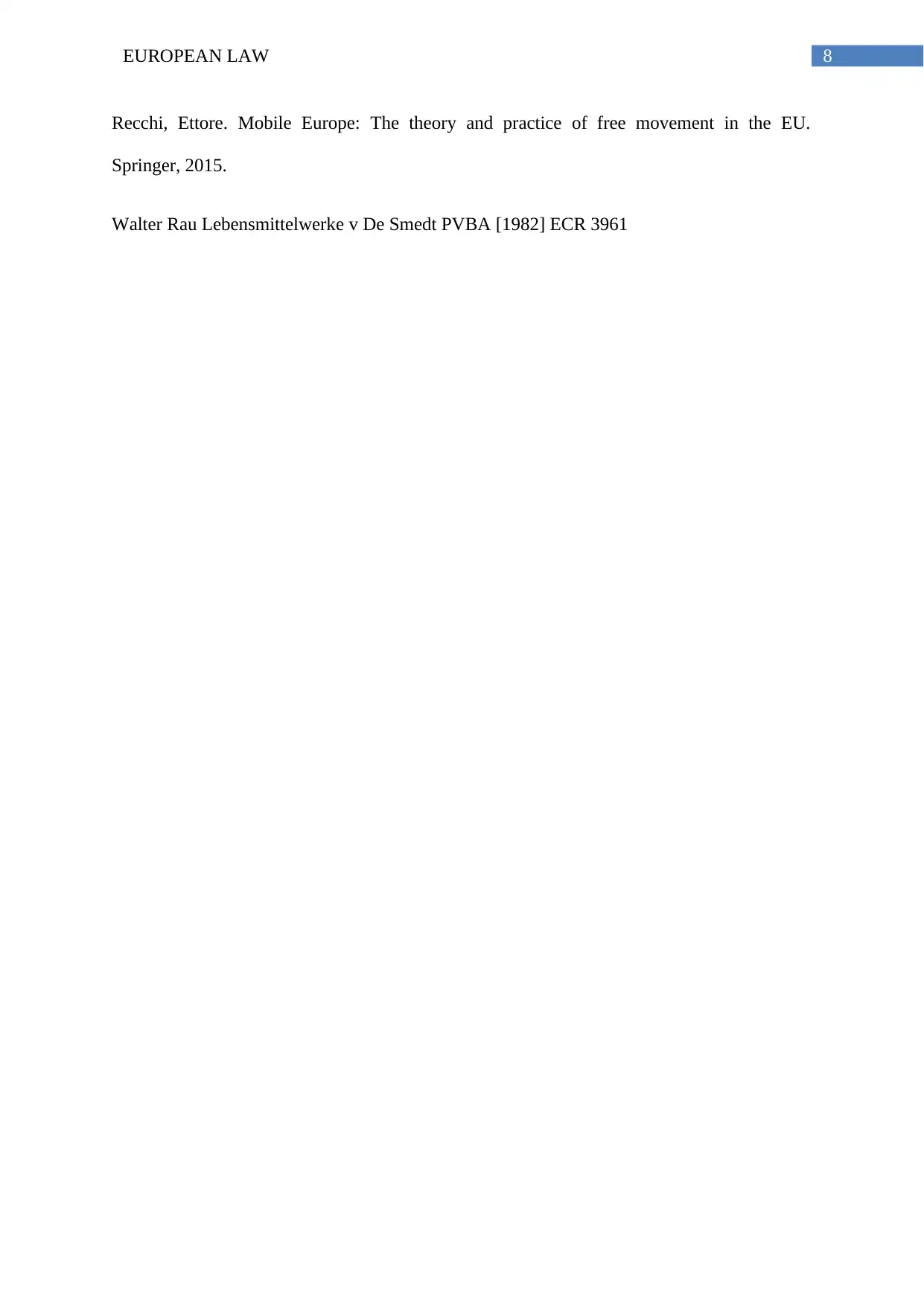
8EUROPEAN LAW
Recchi, Ettore. Mobile Europe: The theory and practice of free movement in the EU.
Springer, 2015.
Walter Rau Lebensmittelwerke v De Smedt PVBA [1982] ECR 3961
Recchi, Ettore. Mobile Europe: The theory and practice of free movement in the EU.
Springer, 2015.
Walter Rau Lebensmittelwerke v De Smedt PVBA [1982] ECR 3961
⊘ This is a preview!⊘
Do you want full access?
Subscribe today to unlock all pages.

Trusted by 1+ million students worldwide
1 out of 9
Related Documents
Your All-in-One AI-Powered Toolkit for Academic Success.
+13062052269
info@desklib.com
Available 24*7 on WhatsApp / Email
![[object Object]](/_next/static/media/star-bottom.7253800d.svg)
Unlock your academic potential
Copyright © 2020–2026 A2Z Services. All Rights Reserved. Developed and managed by ZUCOL.





